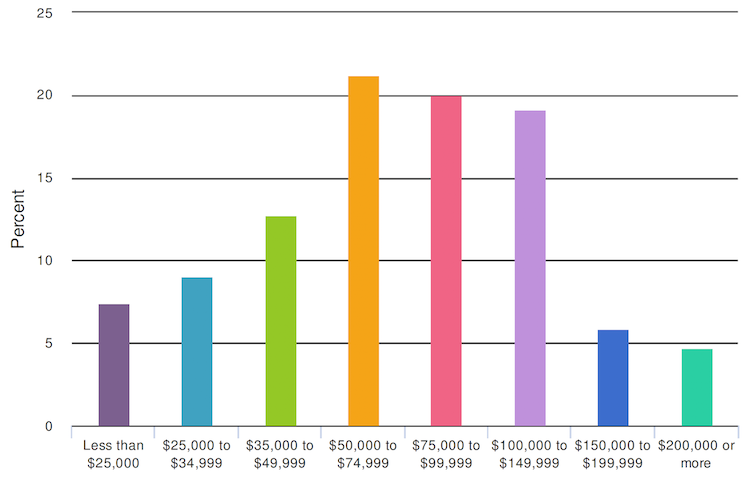Fuel COVID-19 Consumer Sentiment Study Volume 6: Fear is Declining
by Melissa Kavanagh
We hope that you find the information useful. The survey was sent out on June 18, 2020, and received more than 6,500 responses. Below is a summary of the findings, along with some observations and opportunities that arise from the results.
Executive Summary
In this survey round, we added a new question pertaining to amenities usage. We’ve also broken down some questions highlighting responses from families living with children, and a new breakdown of red vs. blue states. Below are the key points:
- We continue to see a slow-rising readiness to travel, with 57% of respondents saying they would consider booking a trip in the next 30 days.
- The number of people who could not be persuaded to book a vacation continues to decline slowly.
- There are still contradictory findings about on-property safety. Virus precautions remain at the top of the list of topics consumers want to hear about from hotels, and fear of interacting with other guests and common areas are the top reasons preventing people from traveling now. However, the most popular response to how people would prefer to check in is still at the front desk.
- Fear of interacting with other guests and common areas saw a marked decline from the last survey.
- There is a large disparity of those who will definitely use an outdoor pool vs. an indoor pool while on vacation. We can see a difference here between state types and with families with children. Additionally, those families with children were more likely to use a lazy river and water slide, but water slide was still only 24%.
- There are notable differences in opinion between red and blue states for housekeeping preferences, things preventing travel, and what could persuade respondents to travel now.
- Open air destinations and 2 hour drive locations are still far more likely to be visited in the near future.
1. What is the first word that you think of when considering travel right now?
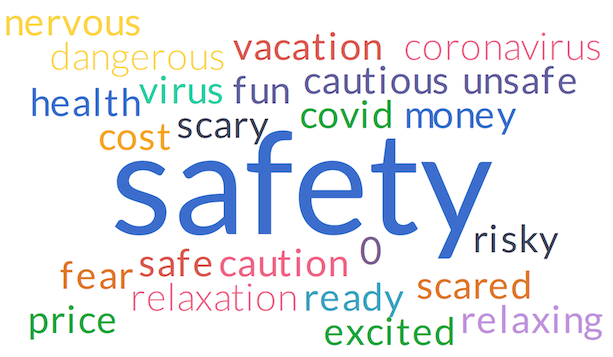
- Observation: “Safety” remains the most popular word.
- Data Comparison: “Scary” continues to shrink in size, although “risky” and “dangerous” remain at the same size we’ve seen through the last few surveys. The various forms of “relax,” have continued to be in the cloud, and “excited” is new to this edition. “Money” and “cost” have made a second appearance in the cloud, and “price” is new. These could indicate that people ARE thinking about traveling and talking about budget items.
- Opportunity: People are concerned for their safety above all, but they are also craving relaxation and freedom from their houses. What can you do to ease their mind about traveling to your property, with their budget concerns in mind?
2. Which of the following would most likely persuade you to book a future vacation during the coronavirus outbreak? (Check all that apply)

- Observation: Nearly 70% of people chose flexibility to change without penalty.
- Data Comparison: People saying that they could not be persuaded decreased for the fifth time, going from 19% to 16%. Reassurance of property sanitizing increased from 58% to 60%.
- Red vs. Blue: Red states voted 65% for flexibility vs. 71% for blue states. Blue states were more interested in a travel insurance policy vs. red.
- Opportunity: Clearly stating your cancellation policy and safety efforts, as well as any changes you have made to it in all marketing efforts is critical.
- Resource: Fuel put this article together on what types of policy changes and messaging you should be implementing right now: The Definitive Guide To COVID19 Policy Updates & Communication.
3. Have you already booked your future stay?
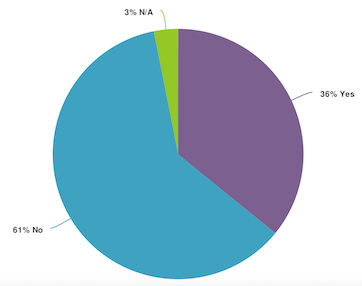
- Observation: 36% of people do have an upcoming stay booked, 61% do not.
- Data Comparison: The percentage of those who have not booked yet decreased from 65% to 61%.
- Opportunity: Coupling this response with the previous insight shows that people WANT to travel and are feeling the need to get out of their houses. 61% of the population is a lot of untapped opportunity.
4. Pick the top 3 reasons that would prevent you from staying at a hotel right now.
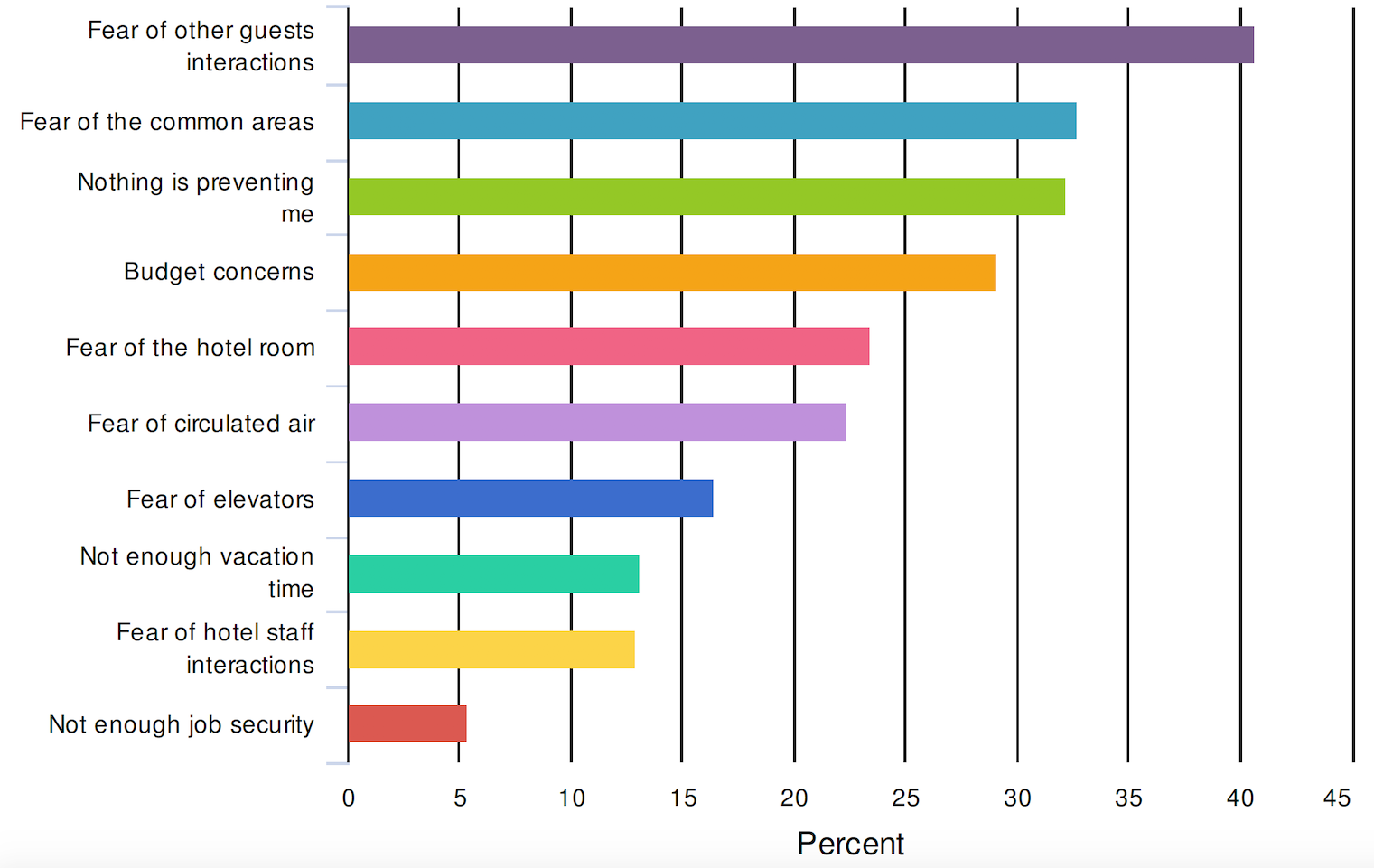
- Observation: The two most popular answers are pertaining to close contact of people on-property. 41% chose fear of other guests interactions, and 33% said fear of the common areas.
- Data Comparison: After seeing many write-in responses on the last survey for “nothing is preventing me,” we added this as an option on this round. It turns out that more than 30% of respondents have nothing holding them back from traveling now. Additionally, fear of guest interactions shrunk from 50% to 41%, and fear of common areas decreased from 43% to just over 30%. Budget concerns decreased slightly, but still remains right about 30%.
- Red vs. Blue: Red states had more budget concerns than blue states. Blue states voted 32% that nothing is preventing them, vs. 27% of red states.
- Households with Children: Those families with children ranked nothing preventing them in the #2 spot, though the percentage of responses is only a percentage point off. Budget concerns were #3, and fear of common areas was ranked #4.
- Opportunity: Be clear with all of your messaging and website information as it pertains to the cleaning procedures on property. Additionally, communicating the status of property amenities, and area attractions and restaurants is extremely important. If your primary consumer is those with children, being mindful of their budget concerns will also be important.
5. During the outbreak, I would like to hear from hotels on the following topics: (check all that apply)
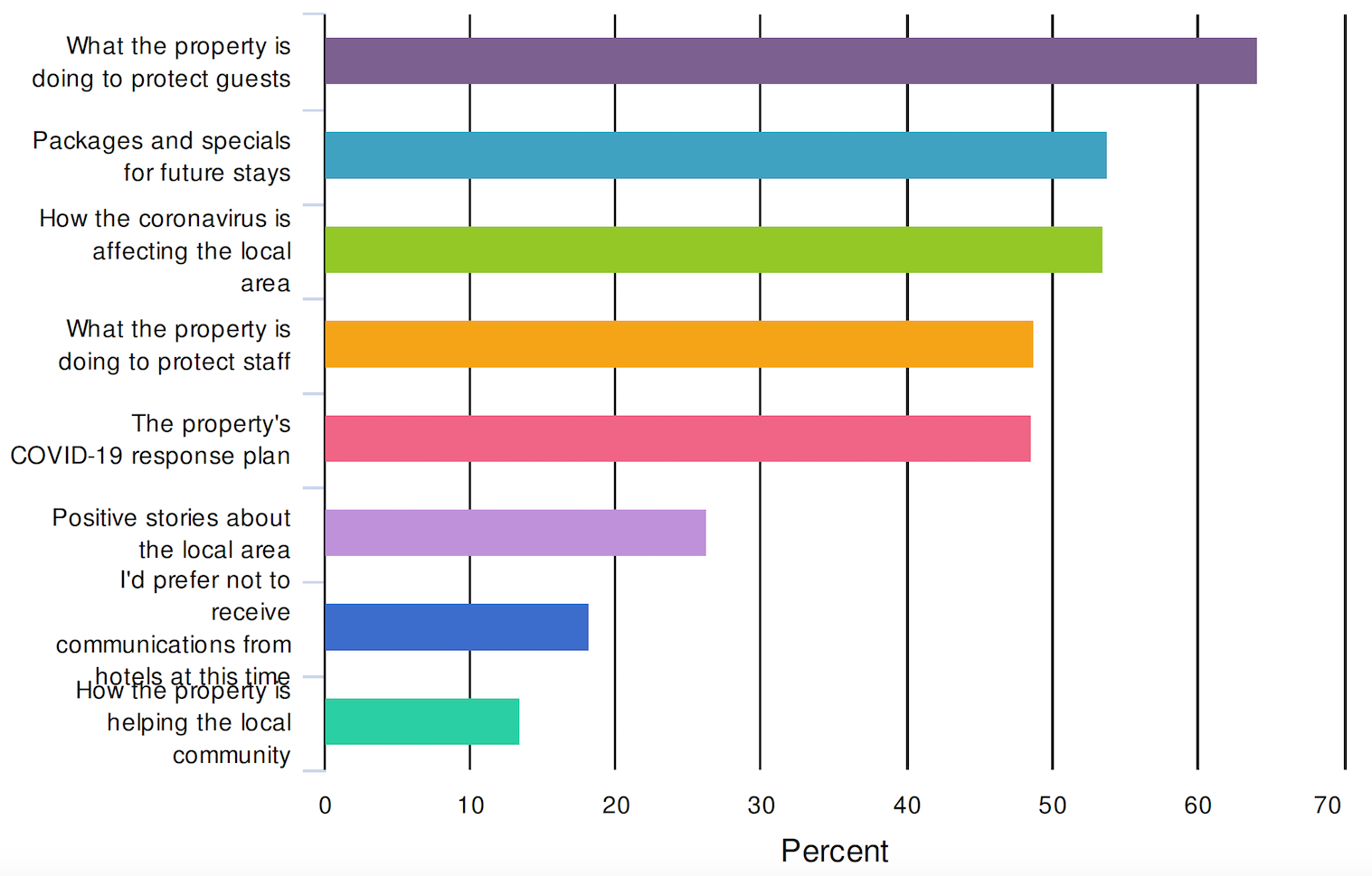
- Observation: Respondents continue to be more interested in learning about what properties are doing to protect guests than they are about receiving deals for future stays. In fact, those asking for packages and specials have decreased from 58% to 53%.
- Data Comparison: Those saying they would not like to hear from hotels now has remained steady, at 18%. Those choosing how the virus is affecting the local area increased in rank from 4th to 3rd, and from 48% to 53% (now equal to packages and specials).
- Opportunity: By proactively messaging your guest database with important information on their safety AND that provides value to them, and shows empathy, you can keep your property top of mind. Being in communication with your guest during this time increases your chances of earning bookings as recovery picks up.
- Resource: Having the right CRM system is critical to this success. Find out how to determine if you are ready for a new one, and for the best strategies for using your system to its fullest ability. Your CRM System Will Determine How (and if) Your Hotel Recovers From COVID-19
6. How likely are you to book a trip:

- Observation: There is growing confidence to book a trip in the next 30 days, with 57% responding “maybe” or higher, 66% within 60 days, and 74% within the next 90 days.
- Data Comparison: Those answering at least “maybe” in the next 30 days increased from 54% to 57%. When we first asked this question on April 16, just 37% responded at least maybe.
7. When do you intend to BOOK your future vacation? & When do you intend to TRAVEL for your future vacation?
BOOK
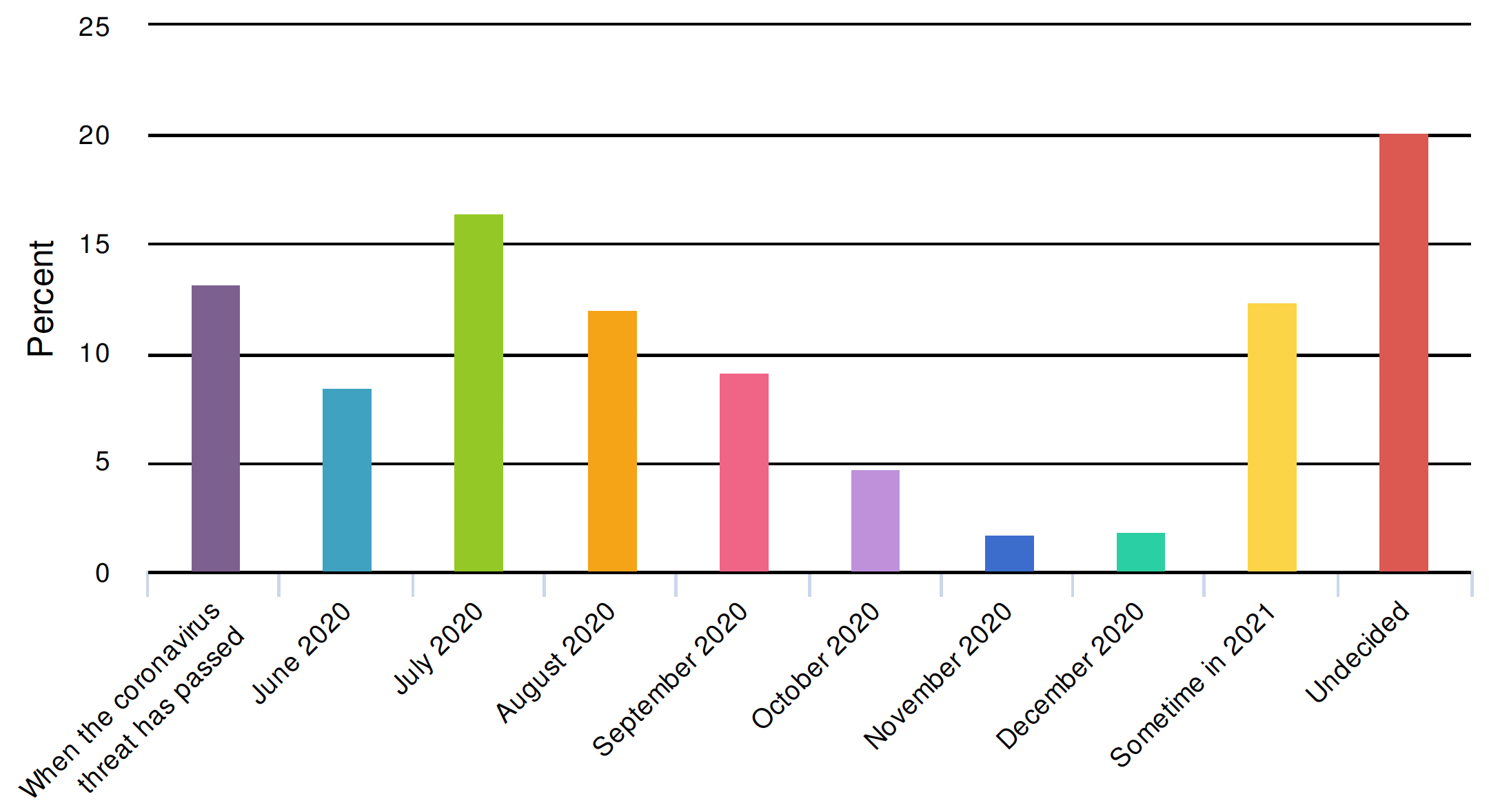
TRAVEL
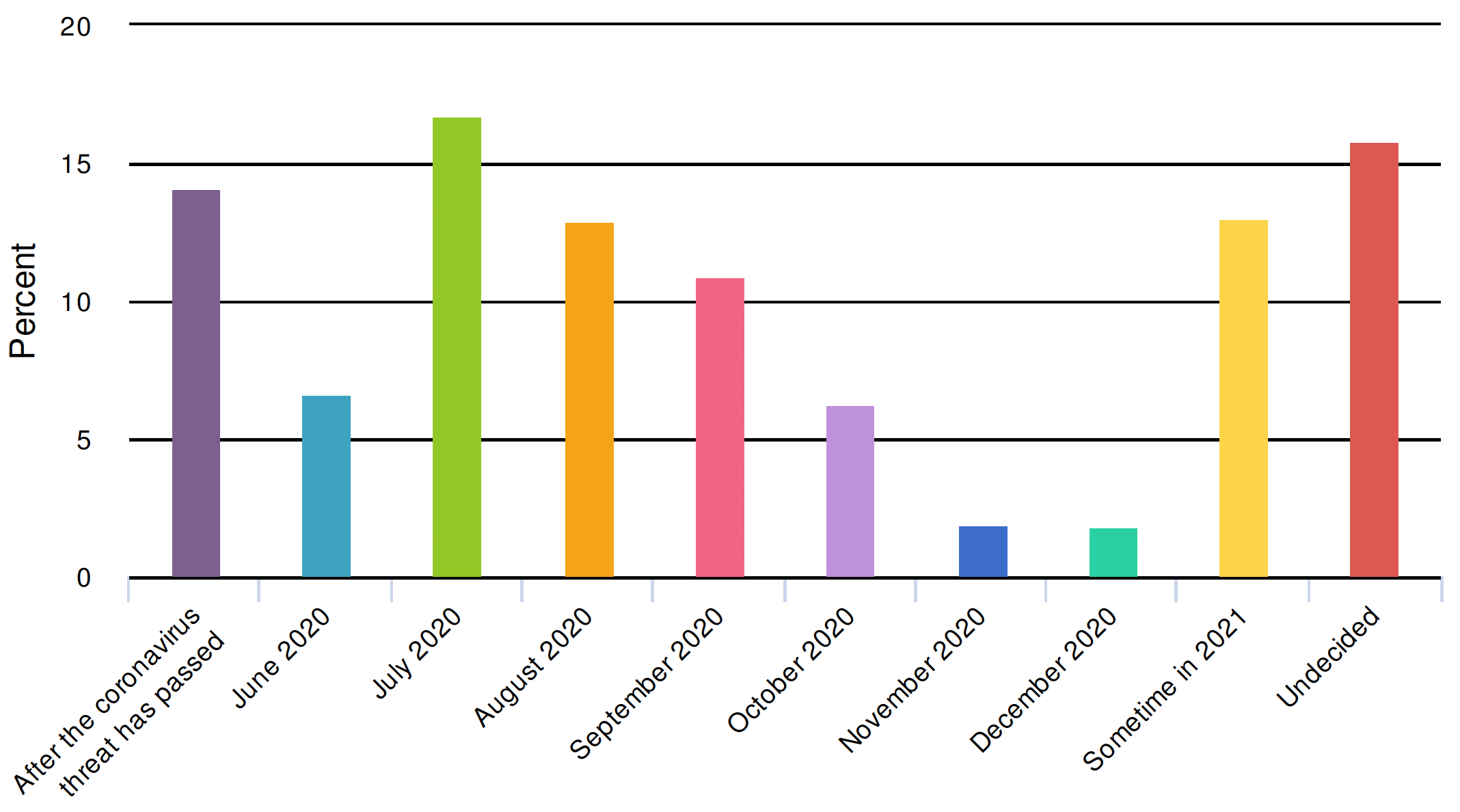
- Observation: For booking, 13% said after the virus has passed, 20% were undecided. Sometime in 2021 was chosen by 12%. Of those that chose a 2020 date, July was most popular, at 16%, followed by August at 12%.
- For traveling, 16% were undecided. July and August were the most popular answer of those that chose a date, at 17% and 14%, respectively.
- Data Comparison: For booking, “sometime in 2021” increased from 9% to 12%. Those who are undecided decreased from 22% to 20%. For travel, “sometime in 2021” increased from 9% to 13%.
8. How soon will you be willing to make the following trips?
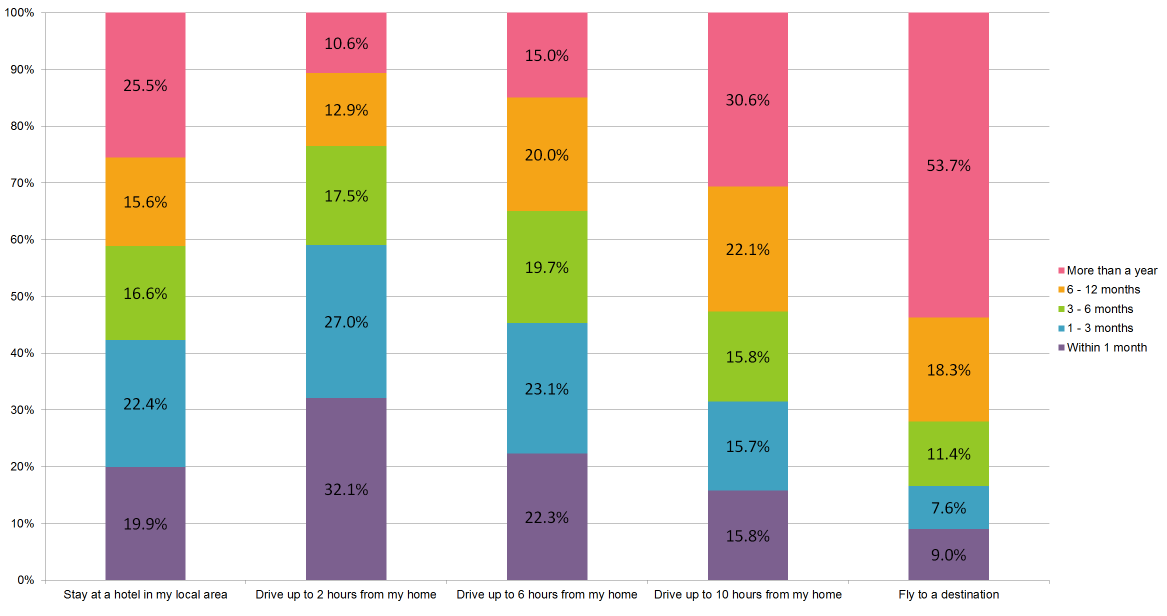
- Observation: For distances of driving up to 2 hours, 59% of consumers will be ready to travel within 3 months, with 32% willing to travel within 1 month. Staying local was at 42% within 3 months, driving up to 6 hours was at 45%, and flying comprised just 17%.
- Data Comparison: Within 1 month, the following were notable changes:
- The 2 hour drive category increased from 29% to 32%. It had previously been as high as 34%.
- Staying local increased from 18% to 20%.
- Up to 6 hours increased from 19% to 22%
- The more than a year response saw increases across all categories, while the 3-6 month response saw decreases across the board.
- Opportunity: The 2 hour drive market remains the most confident for traveling sooner rather than later. For the near future, targeting these consumers via email and paid search will yield the best returns.
- Resource: Fuel has developed A How-To Guide For Targeting Drive Markets
9. How soon will you be willing to travel to the following types of destination?
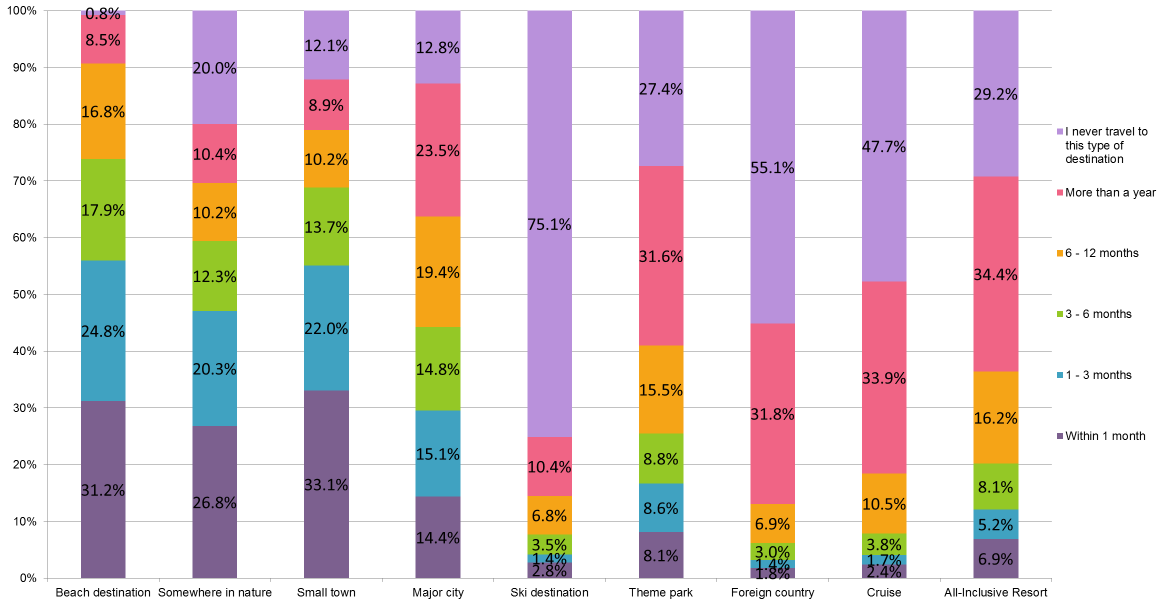
- Observation: Destinations with opens spaces are still far more likely to be visited earlier than densely populated areas, or high-touch destinations.
- Data comparison: We did add another response choice of “I never travel to this type of destination” which impacted ski destination, foreign country and cruise categories the most. This addition would negatively affect the “more than a year” response group most.
There was little fluctuation within the 1 month response group for any destination type. - Opportunity: We are already seeing an influx in bookings in beach destinations as they have opened. All destinations need to be ready for this when the area opens up.
10. Given the option, rank in order how you would most like to check-in for your next vacation?
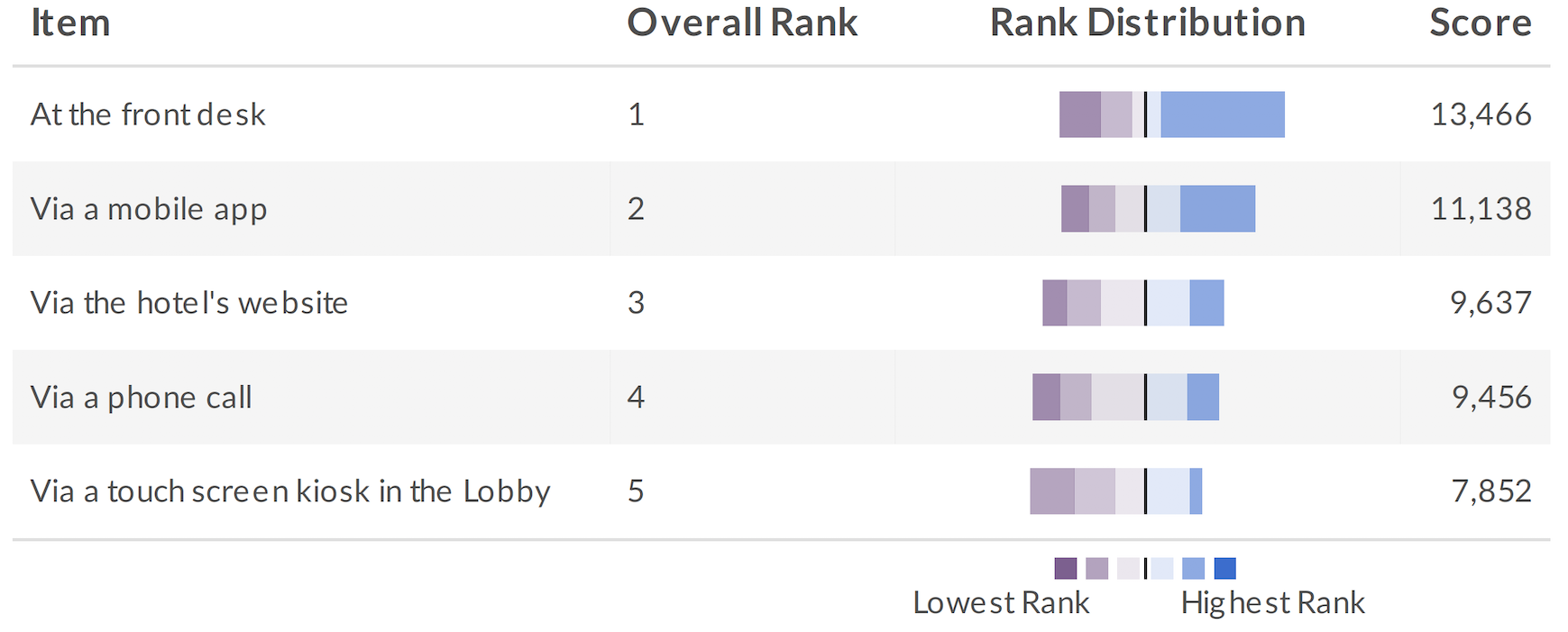
- Observation: “At the front desk” continues to be ranked first. A mobile app was far more preferred to a kiosk in the lobby.
- Data Comparison: There was no change in ranking of preference since the last survey.
- Opportunity: Safety (and the perception of it) at your front desk will be critical to keeping customers comfortable. Having a mobile app that allows for a reduced-contact check-in would be very valuable to a large percentage of consumers.
- Resource: Here is some information on a potential mobile app for your hotel.
11. For your next vacation, what level of house keeping would you prefer?

- Observation: Responses were quite diverse, however, the most popular response was “only when requested,” at 27%. 21% still want daily, full service, and another 22% would like daily towel changes.
- Red vs. Blue: Both groups ranked “only when requested” as #1. Red states voted for daily switching towels as #2, and daily full service as #3 (only 19%). Blue states had those choices in reverse order, and were just a percentage point apart at 23-24%.
- Data Comparison: Daily switching of towels moved into the #2 spot, nudging out daily full service. Both were at 22% on the last survey.
- Opportunity: If you haven’t already, this is time to re-think housekeeping procedures entirely. Will you cut down to “by request only?” Will daily housekeeping be an up-charge?
12. During your next vacation, how likely are you to use the following amenities?
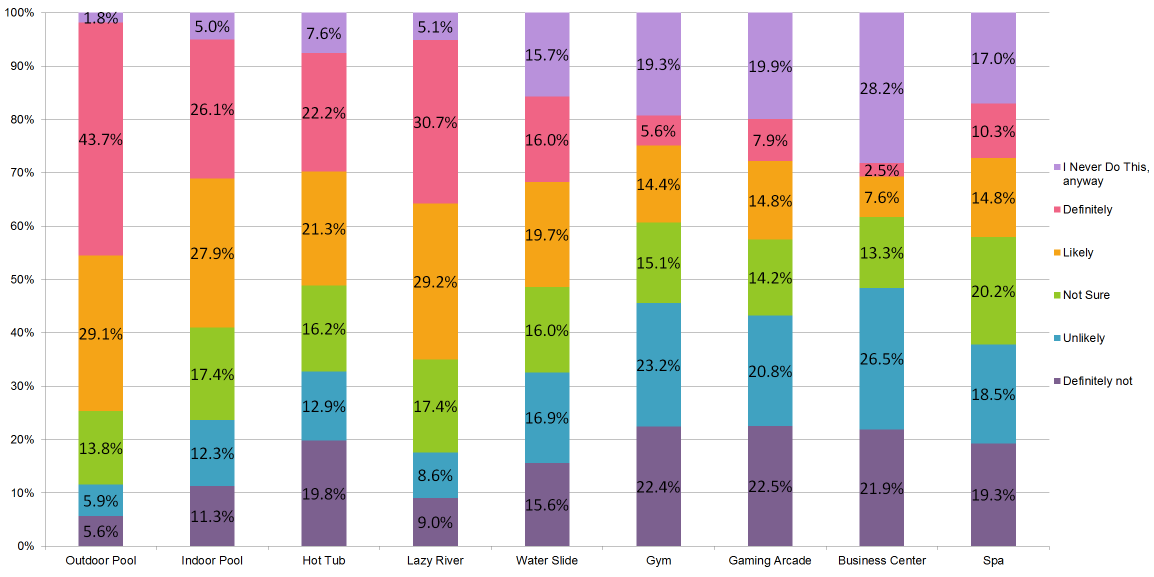
- Observation: Outdoor pool was far more popular than any other amenity. 44% of respondents said they would definitely use an outdoor pool vs. 26% for an indoor pool. Those choosing definitely for a lazy river was 31% vs. just 16% for a water slide.
- Households with children: This demographic was much more inclined to use the lazy river, at 41%, and slightly more inclined to use a water slide, at 24%. Those voting definitely to an outdoor pool was a whopping 53%!
- Red vs. Blue: Red states voting “definitely” for the outdoor pool was 39% vs. 44% of blue states.
- Opportunity: Clearly explaining health safety procedures for all amenities is important, so that guests will know what to expect when they arrive. This is particularly true if it means restrictions on how many people can be present, or if masks are required, etc.
13. During your next vacation how likely are you to do the following?

- Observation: Respondents voted that eating on property and at local restaurants OUTSIDE was far more favorable to eating at those places inside. However, there was some positive movement for those saying yes to inside eating.
- Data Comparison: We saw small increases in those saying likely or very likely for indoor options: on-property restaurant increased from 44% to 45%; local restaurant increased from to 52% to 54%.
- Households with Children: 80% of respondents with children said they would definitely or likely buy groceries for the room, vs. 74% for the whole group.
- Opportunity: If you have an on-property restaurant, promoting outdoor seating will be a large benefit. Additionally, with consumers being as likely to buy groceries to eat in their rooms (and more-so for guests with children), properties that have rooms with kitchens have a huge advantage. Showcasing those kitchens is imperative now.
14. Complete the following sentence: I will travel when:
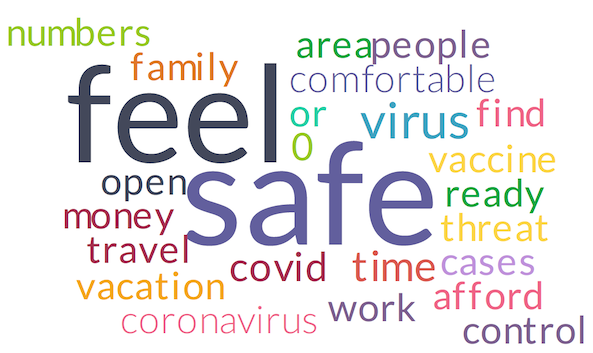
- Observation: “Feel safe” is most prevalent since we first asked this question. Phrases relating to a vaccine, number of virus cases declining have also been popular.
- Data Comparison: We continue to see “afford,” “money,” and “work,” similar to what we saw in the word cloud asking about traveling now. Finances may be becoming more of an issue, the longer the lock-downs continue in many areas. “Area” and “open” would indicate that consumers want to be assured that the surrounding area to the hotel will be open (restaurants, attractions, etc.)
- Opportunity: As mentioned before, whatever you can do to assure visitors that you have their well-being as a priority will increase your chance in convincing them to stay with you. Being cognizant of the financial stress many people are feeling, and providing value-add items to packages where possible will help consumers feel more comfortable booking.
Wrapping it Up
We have now been sending out these surveys for nearly 3 months. In this time, respondents have been consistently sending the same message: they care about their health safety. This is THE most important factor in determining if, and when, people will feel comfortable traveling again. Knowing what properties are doing to protect their safety is critical. Open-spaced destinations are primed to gain new visitors that would have otherwise been traveling to big cities or abroad.
Fear is diminishing slowly. Properties need to be doing all they can to capture the desire to travel, while keeping budget concerns and safety in the forefront of all messaging. Those who do this well are most inclined to recover the fastest from this pandemic.
Survey Methodology
This was a self-reporting survey sent to a database of leisure travelers located in North America. Questions containing multiple checkbox responses had the options randomized to avoid positional bias. 4,800 respondents completed all questions.
Breakdown of red and blue states is as follows:
Red: AL, AR, GA, LA, MT, ND, SC, SD, TN, WV
Blue: CA, CT, DE, IL, MA, MD, ME, NH, NJ, NY
Below is the demographic breakdown of respondents.
Age & Gender:
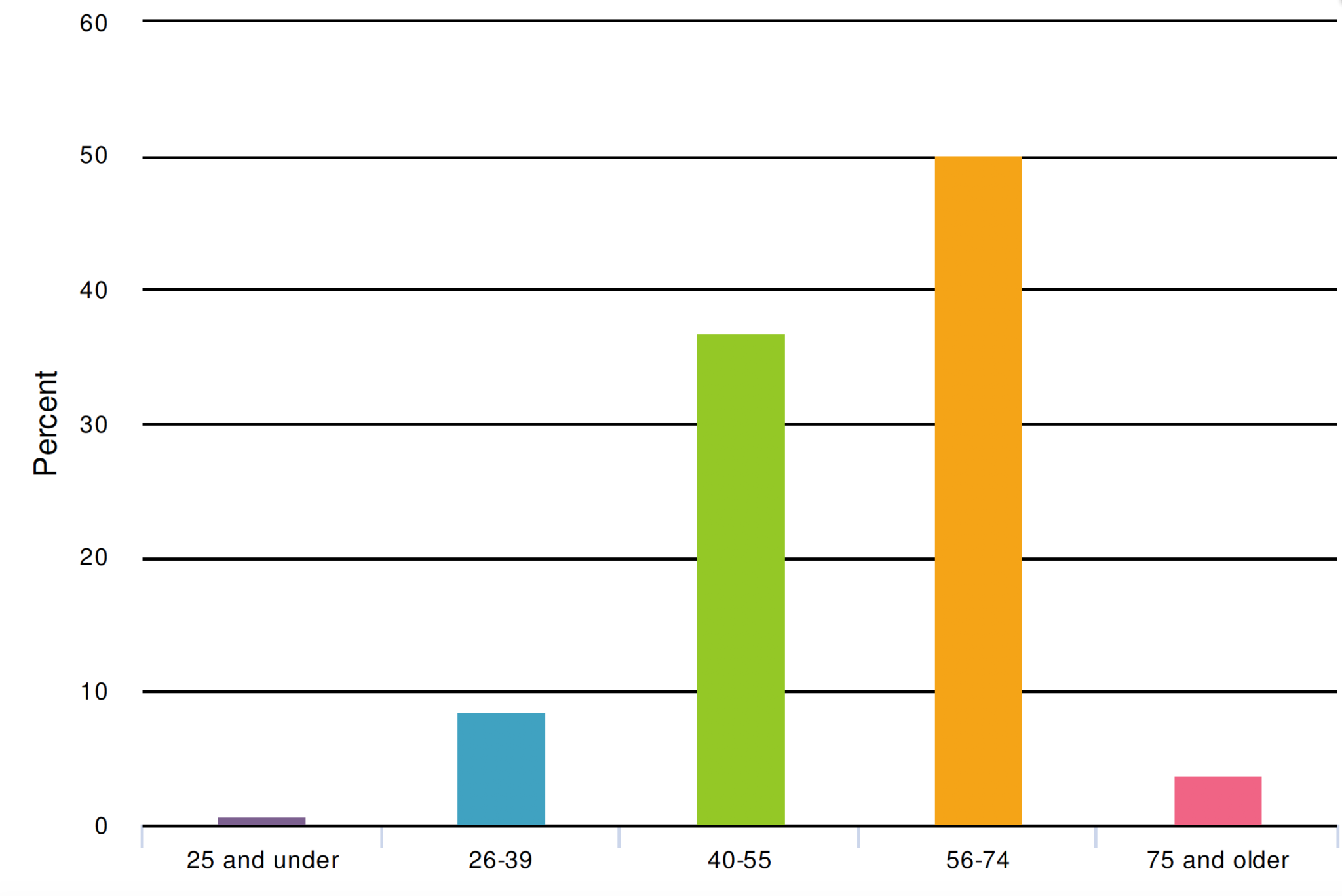

Do you have children living at home with you?
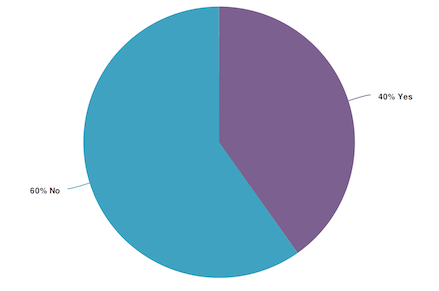
What was your total estimated household income before taxes during the past
12 months?
